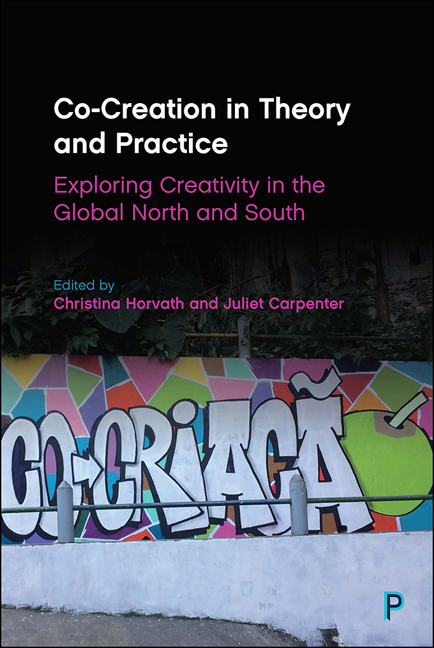8 - Co-Creation, Social Capital and Advocacy: the Neighbourhood and Community Improvement Programme, Mexico City
Published online by Cambridge University Press: 18 March 2021
Summary
Introduction
This chapter suggests that community social capital generated in public programmes is one of the key inputs for advocacy actions and therefore is a determining factor that impacts communities, either through the results of its application or via the redesign of policies and programmes. Based on this premise, the authors suggest that a cohesive process in a city should involve participatory action, engaging with communities and making their inclusion in the decision-making process possible. These could include Co-Creation, in two aspects. The first is as a method that, with different actions, can promote a process of cohesion. In this sense, as some contributors to this book analyse it, Co-Creation uses art as a catalyst and involves different actors to promote knowledge production. Through the development of community social capital as described above, the authors believe, however, that Co-Creation has a second sense: that is, as a participatory process that includes distinct actors and distinct actions to have an impact on social cohesion in marginalised communities through the implementation of governmental plans. The core aim of this chapter is to explore this second aspect of Co-Creation, through analysing the experience of the Neighbourhood and Community Improvement Programme in Mexico City. Although the main focus of this book is on the first aspect, this chapter will argue that – given the important benefits that marginalised communities can gain from advocacy resulting from programmes implemented in close collaboration with the state – this second aspect is not to be dismissed.
Currently, the crisis of representative democracy and the weakening of institutions in the world encourages citizens to seek involvement through discussing public problems directly (Mounk, 2017; Martino, 2018). In this context, the idea of involving citizens in making decisions becomes relevant. In terms of participatory democracy, the notion of citizen participation aimed at inclusion, empowerment, articulation and sustained dialogue between multiple and plural actors assumes a fairer distribution of power and the construction of a balance between civil society and the state. Some contributors to this volume consider that one of these options is Co-Creation, understood as a process that includes the participation of civil society to achieve changes in public policies and programmes in public spaces by bringing different stakeholders together and using artistic tools and expressions.
- Type
- Chapter
- Information
- Co-Creation in Theory and PracticeExploring Creativity in the Global North and South, pp. 121 - 134Publisher: Bristol University PressPrint publication year: 2020

